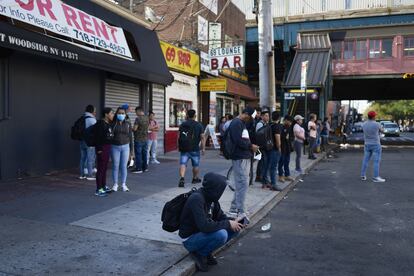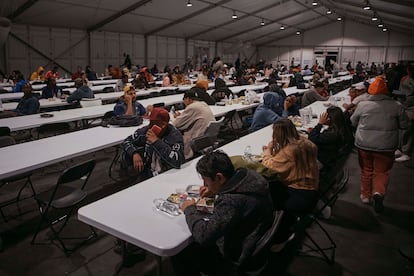Thousands of migrants celebrate Thanksgiving in fear of being deported
Unlike other states, New York offers additional safeguards that partially protect the undocumented from the immigration policy announced by Donald Trump. ‘New York is a sanctuary city and we are going to defend that status against any divisive rhetoric,’ says the head of a non-profit that helps newcomers


The fear of mass deportations — and potential family separations — looms over tens of thousands of migrants like those who attended a Thanksgiving food distribution drive last week organized by the NGO New Immigrant Community Empowerment (NICE). For many of them, Thursday will be their first Thanksgiving, the most important date on the American holiday calendar. But it could also be their last if Donald Trump’s plans to expel undocumented immigrants (an estimated 11.3 million across the U.S., with 412,000 in New York) ultimately come to pass despite the numerous technical complexities involved, chiefly the management of case files.
Gladys Carolina, a Venezuelan who arrived in New York in March with her husband and two children, aged 17 and nine, downplays the threat, but does not conceal her anxiety. “Those of us who have crossed the Darién jungle and survived the Beast [the freight train that crosses Mexico], can face anything except returning to Venezuela. But of course we are afraid of what could happen, we are on edge, because it is an unknown factor.”
Standing next to her, Carolina López, a 28-year-old Ecuadorian, clings to the bag with the turkey that the NGO gave her while cradling Liam, who is two months old. Her first Thanksgiving dinner, which in other circumstances would be a joyful one, is marred by the fear that an expulsion order will separate her from her son. “I am terrified for the baby, because if they deport me they will leave him here, where he was born. My husband hopes to receive a work permit soon, but it seems that even this does not guarantee anything either,” she explains. According to immigration lawyers, a work permit application does not exempt applicants from deportation.
Gladys, who along with the rest of her family is the beneficiary of a program called Temporary Protection Status (TPS) because they come from Venezuela, runs the same risk of expulsion as Carolina, an economic immigrant without legal protection. To the future Republican administration, there are no differences between them, and the two million legal temporary residents like Gladys and her family — in total, 4% of all foreigners living in the U.S. in 2022, according to the Pew Research Center — are just part of the complex and dysfunctional immigration system, which currently has 3.7 million pending cases. At the current rate, processing would take four years, but it could be as long as 16 years under the president-elect’s mass deportation plan. The entire operation could cost taxpayers between $150 billion and $350 billion.

Human rights groups and activists have called on President Joe Biden to speed up measures to protect the most vulnerable migrants, the undocumented ones, but also the holders of a green card, the once precious residence and work permit, which will no longer protect them. Among the members of the NICE community, “there are diverse immigration statuses: people with TPS, beneficiaries of DACA [the Obama-era program for “Dreamers” who came to the country as children, and which Trump already targeted in his first term], people without any documents at all, even after 20 or 30 years of residence in the country; some who are married to American citizens or have American children,” explains Nilbia Coyote, executive director of the NGO. All of them are covered by additional guarantees provided by the laws of New York State that, for example, undocumented day laborers in southern California lack, making them the likely first victims of Trump’s plans.
“All of these people are part of New York, and they are a visible part of it, no longer living in the shadows thanks to years of work and struggle,” says Coyote. “New York is a sanctuary city and we are going to defend that status against any divisive rhetoric. We have lived through other crises, such as the pandemic or the crisis that started in the spring of 2022.” She is alluding to a period when tens of thousands of immigrants were transferred to Democratic cities such as New York, Denver, Boston, and Chicago by the Republican governor of Texas, Greg Abbott, to put pressure on the federal government, and NICE welcomed as many as a thousand people a month. “Eight years ago [during Trump’s first presidency] and two weeks ago we heard the same thing: ‘I have to go to work at three in the morning to do three shifts in a row,’” Coyote continues, “that is the reality.”
The director of NICE puts contingency plans into perspective to stress that the urgent should not overshadow the important, “empowering those who arrive with a learning plan for everyday life, on how to process the State ID [a legal identity document that is valid even for undocumented people], the driver’s license, how to open a bank account… They are resilient people, who have crossed seven or eight borders and of course they have anxiety, feelings… but they are not alone. We cannot let ourselves be carried away by fear just when there is more to do than ever.”
Legal services, on the lookout
Omayra, a volunteer who regulates the food delivery line, says that to calm people down, they often tell migrants that deportation plans will first affect those with a criminal record or a previous expulsion order, an assumption that has been confirmed by the incoming administration’s own “border czar,” Tom Homan. But no one is immune from a chance encounter with police on the street, for example. “Our legal team is prepared to respond to urgent cases, mental health services have also been reinforced, but we have to wait and see what the deportation machinery is like,” Coyote stresses. Gladys Carolina says she does not fear a run-in with the police, because “we are good people, our record is clean as a whistle,” but her Ecuadorian namesake suffers every time her husband ventures into the neighborhood. “When he returns late to the shelter, I already fear that something has happened to him,” she explains.
In other parts of the country, such as agricultural areas where undocumented work is the norm, NGOs remind migrants that they have the right to remain silent if they are detained, that they should only open the door to immigration agents with a warrant, that they should not sign any papers without a lawyer present, and, most especially, that they should prepare a family contingency plan: a power of attorney or equivalent in case they are separated from their children, in favor of any guardians who remain to care for them.
“We don’t want to encourage more fear, but we do want everyone to be prepared for any eventuality,” said Luz Gallegos, executive director of Centro Legal TODEC, a California NGO that holds daily information sessions in workplaces after its helpline was overwhelmed by a flood of inquiries immediately after the election results were announced.
The uncertain fate of an undocumented immigrant will differ greatly depending on where he or she lives: it is rather bleak in Texas, which has been proposed as the great springboard for repatriation; ambiguous in California, with a legion of illegal immigrants without whose work there would be no harvest; and more benign in New York, where migrants are mostly employed in construction and services. “The whole country would come to a standstill if migrants were deported,” Coyote notes. The Big Apple, “in addition to offering them aid” such as the aforementioned state identity card, food stamps or health care — which allowed Carolina López to give birth “without any kind of problem or papers” in a large hospital — also protects them, theoretically, with laws that limit the cooperation of the NYPD with federal agents when executing a deportation order. However, the feared Immigration and Customs Enforcement (ICE), which outranks the local police department, has the prerogative to detain people in the city even though neither the city nor the state have external borders.
It is a paradox that the city that has struggled to accommodate more than 223,000 new migrants in the past two years — more than 150,000 of whom have already left the shelter system and are living on their own or have gone elsewhere — is now forced to do the opposite, to expel them. The mayor, the Democrat Eric Adams — politically weakened after being indicted for corruption — has said he opposes mass deportations, but not expulsions for those accused of crimes. Both Gladys Carolina and Carolina López still live in shelters, but on Thanksgiving Day they will carve the turkey delivered to them by NICE in the homes of acquaintances and relatives who have already taken a step toward integration and live in shared apartments. “What harm are we doing if all we want to do is to work and live decently to raise our son?” Carolina López asks. “Staying in the United States is not a whim or a dream, it is the only possible option, because we cannot return to Venezuela,” concludes Gladys.
Sign up for our weekly newsletter to get more English-language news coverage from EL PAÍS USA Edition
Tu suscripción se está usando en otro dispositivo
¿Quieres añadir otro usuario a tu suscripción?
Si continúas leyendo en este dispositivo, no se podrá leer en el otro.
FlechaTu suscripción se está usando en otro dispositivo y solo puedes acceder a EL PAÍS desde un dispositivo a la vez.
Si quieres compartir tu cuenta, cambia tu suscripción a la modalidad Premium, así podrás añadir otro usuario. Cada uno accederá con su propia cuenta de email, lo que os permitirá personalizar vuestra experiencia en EL PAÍS.
¿Tienes una suscripción de empresa? Accede aquí para contratar más cuentas.
En el caso de no saber quién está usando tu cuenta, te recomendamos cambiar tu contraseña aquí.
Si decides continuar compartiendo tu cuenta, este mensaje se mostrará en tu dispositivo y en el de la otra persona que está usando tu cuenta de forma indefinida, afectando a tu experiencia de lectura. Puedes consultar aquí los términos y condiciones de la suscripción digital.








































